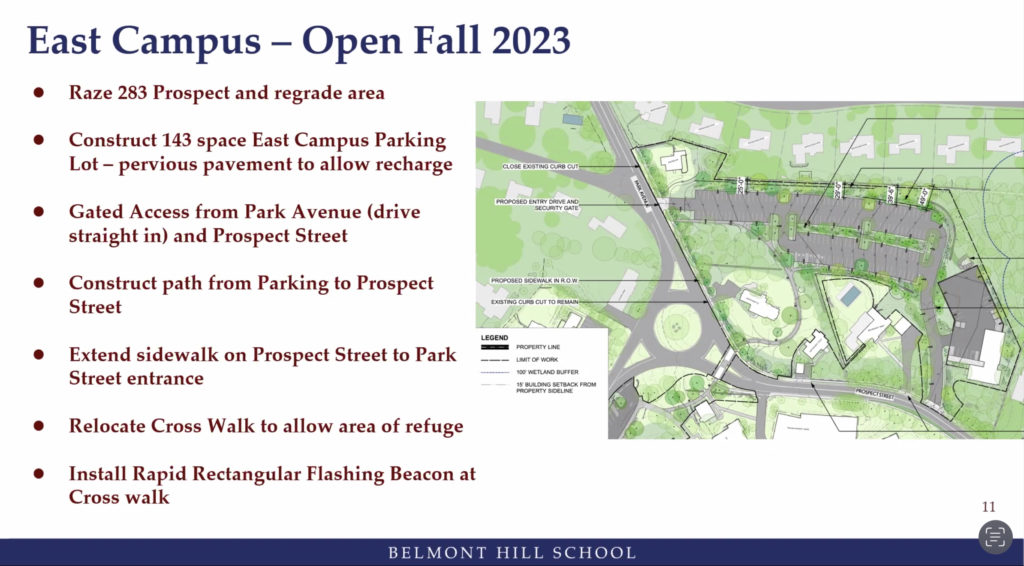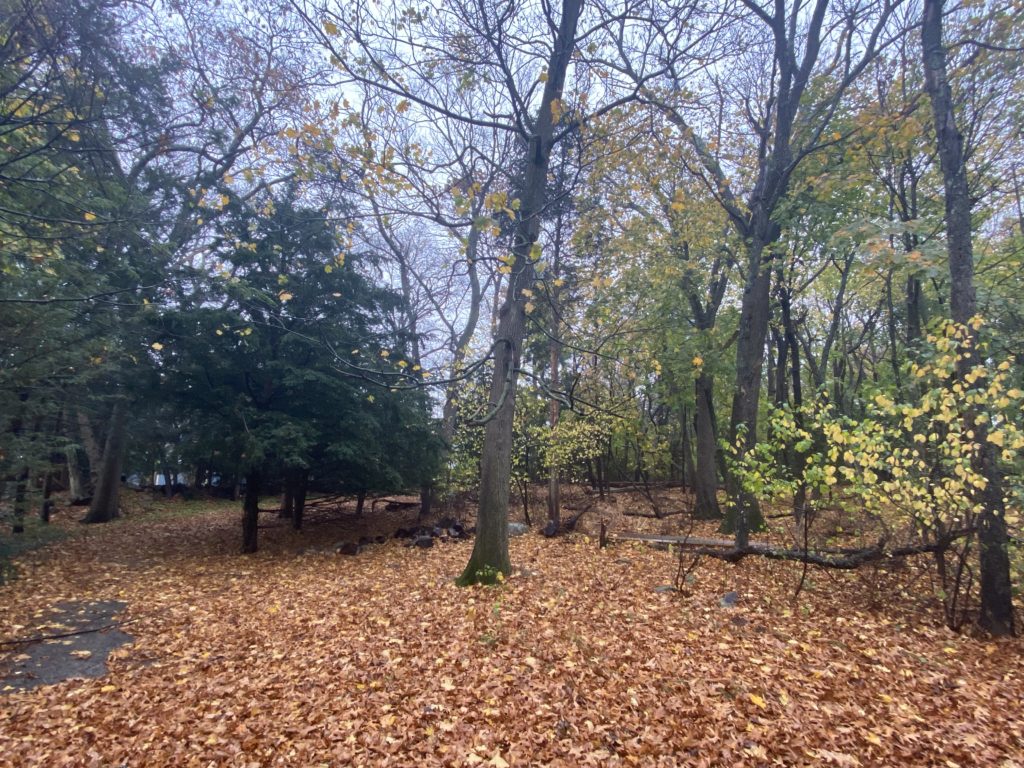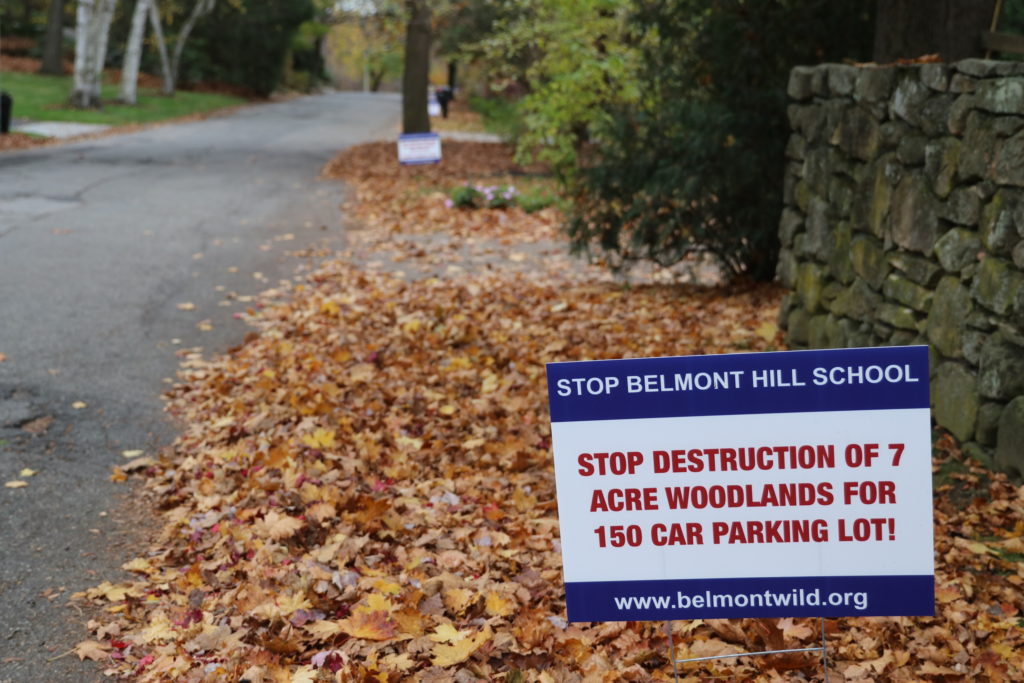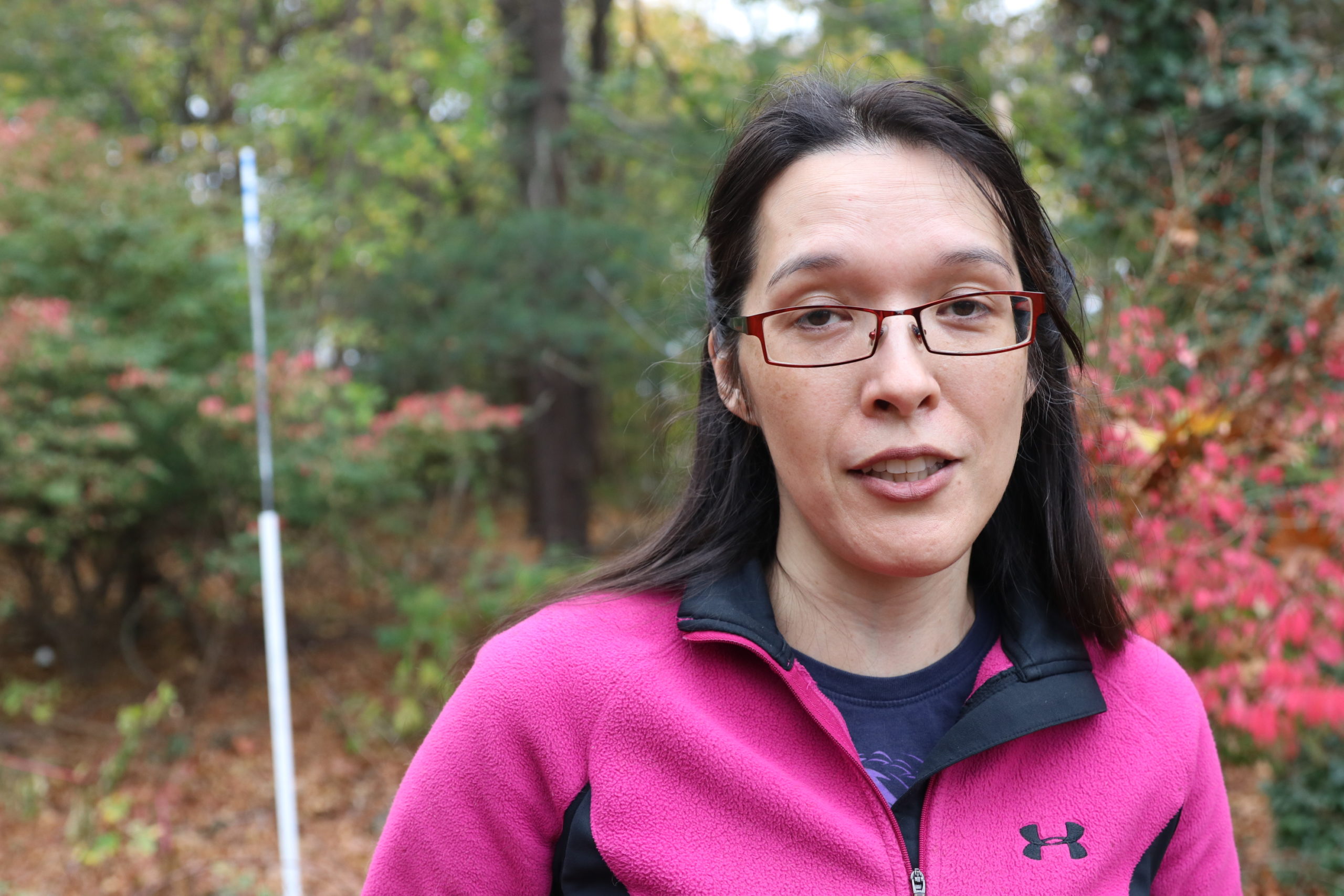Photo: Rutledge Road’s Tanya Austin whose family house abuts a proposed 150-vehicle parking lot on property owned by the Belmont Hill School.
When Tanya Austin and her family were looking to decamp from Central Square two years ago, they wanted a location near the bustle and restaurants of Cambridge but with more living space and where she could set up shop to continue working from home due to the Covid-19 pandemic.
The Harvard Law grad, with her husband and daughter, found what they were looking for in a 1940s-era garrison colonial on Rutledge Road, just two doors from their good friends who move to Belmont years before.
“We were scoping this place online three weeks before it actually went on the market. We really wanted this house,” Austin said.
A big bonus buying on Rutledge for Austin is the ramble of brush made up of shrubs, old trees, and vines left for years to run wild that occupies the land adjacent her small backyard.
“In the summer, there are raspberry bushes which are great, and sunlight comes through the trees on sunny days. It’s just a beautiful, quiet whole area out there,” said Austin.
It was also the location of the Belmont Hill School, the nearly century-old prep school located south of the Prospect Street rotary, aiming to create a 150-space parking lot and above-ground fuel tanks, a building for the school’s facilities department. It is part of a parking plan that includes formalizing and adding spaces behind its sports facility on Marsh Street and reconfiguring the parking and drop-off area at the school’s main entrance.
Primarily a day school, 437 of the school’s 464 pupils commute daily from 84 communities across New England to attend; a new parking scheme will allow the school to manage its long-term parking goals better.
Over the past decade, the school has been purchasing parcels just north of its campus to develop the land and finalize parking.

Where now Austin sees deer bound through the underbrush, there is a thin white pole that demarcates the property line where, if the school prevails, an eight-foot-tall wooden wall will run the length of the lot.
It was then when the proposal became real, said Austin.
The neighbors and residents across Belmont Hill have been mobilizing to bring the proposal to a halt. Nearly every property along Rutledge and throughout the area has become home to lawn signs questioning the proposal. In addition, an ad hoc group of residents have created a website (belmontwild.org) detailing the opposition, while a change.org internet petition has collected more than 2,000 supporter signatures.
As critics have been organizing, the school is moving forward with its efforts as it has formally introduced its plans before the town in September in a detailed, one-hour-long presentation before the Belmont Planning Board.
While the school sought a quick turnaround, unforeseen delays hit the proposal. Due to the sudden departure of the Planning Board’s chair and while finding replacements – the newest member will be voted by the Select Board on Monday – the proposal is coming before the board on Tuesday, Nov. 15, for the beginning of the design and site plan review.
The link to the virtual meeting is: https://us02web.zoom.us/j/88025342855
Webinar ID: 880 2534 2855
Speaking along the property line, Austin spoke about the proposal and its future.
Q: Why is this land of brush and old trees important to you, your neighbors, and the wider community?
A: The seven acres of woods are important not only for what they are – a stand of decades-old trees, a habitat for all kinds of wildlife, and a safeguard for the adjoining protected wetlands – but for what they represent. The area is one of the few remaining open, wooded spaces in Belmont, and our Town should be committing to the long-term preservation of our environment, rather than to fulfillment of the short-term wants of the Belmont Hill School.
Q: What would the destruction of the land into a parking lot mean to abutters and the neighborhood?
A: For immediate abutters, the replacement of the woodlands with a 150-space parking lot and equipment maintenance facility would of course be devastating. No one wants that kind of noise, light, and pollution mere feet from their backyards.
But it doesn’t just affect us, it affects everyone who drives down Prospect Street or Park Avenue, where commuter traffic is already at a standstill during rush hour; it affects all residents of Belmont, since the school will not be paying taxes on the adjoining houses it demolishes to complete its plans, thus reducing funds available to the Town; and it affects our children, who will learn the unfortunate lesson that environmental and community concerns apparently do not outweigh the short-sighted plans of a private school with money to spend.

Q: When did it become apparent to you and the neighbors that Belmont Hill School was determined to move forward with the proposal for a 150-space parking lot, a facilities building, and above ground fuel tanks?
A: We first became aware of the proposed project in November 2021, and actually attended two meetings that winter, one public and one private, with the school at which they presented their plans. We were hopeful at the time that the school would be willing to work with us, or at least give due consideration to our stated objections: the environmental impact, the effect on traffic, and of course the consequences to immediate abutters.
But it wasn’t until our third meeting with the school on May 25, 2022 that it really became clear that they were not at all interested in hearing what we had to say. We were literally told that no changes would be made to their plan unless the Town forced the school to make them, and at that point we knew we had to take action.
Q: What has been the relationship between the neighbors and the school? Has the school been receptive to neighbors concerns? Can you point to one incident that would highlight the interaction?
A: Until about a year ago I would have said that the neighborhood had a good relationship with the school, which has always touted its openness to community concerns and its collaboration with neighbors. But despite its claims to wanting to work with us and adapt its plans to our needs, the school has done nothing substantive towards that goal– instead, it has made cosmetic changes that have no real effect on the scope of the project, and attempted to pass them off as compromise.
One of the most egregious examples is the school’s oft-repeated claim that in response to our concerns that the curved driveway into the parking lot would cause approaching vehicles’ headlights to shine into neighbors’ yards, the school took the significant step of purchasing the property at 20 Park Ave., allowing the driveway to be straightened. However, it’s our understanding that the school had been attempting to purchase that property for years, well before anyone expressed concerns about the driveway, characterizing their purchase now as an act of benevolence is just disingenuous.
Q: Has the neighbors and supporters reached out to town officials such as the Town Administrator, Community Development and the Planning Board? What has been their response?
A: We have repeatedly reached out to the Planning Board, Select Board, and the Town Administrator to discuss this issue. In fact, they are probably tired of hearing from us! In general they have been very open to hearing us out. Several board members and the Town Administrator have come out to view the property in person, rather than relying on the maps submitted by the school, and have encouraged us to attend and speak out at board meetings to make our voices heard in the review process. However, I’m not sure that this will be enough if the school isn’t willing to compromise.
Q: What is the neighbors seeking from the school, such as reduction in size or placing the parking on the main campus? Has the neighbors communicated with the school on these areas of compromise?
A: As a group, the neighbors have made many suggestions, both general and specific, as to how the school could revise its plans in a way that would be satisfactory to both the school and the Town. Unfortunately, the school has flatly refused to consider them, instead making minor changes that pay lip service to the idea of compromise, while accusing our group of being inflexible. Many of our suggestions have been met with the claim that the school has already deemed them to be impossible or impractical– without any further discussion of how they arrived at that conclusion.

At this point, the problem is not so much the specific details of the plan– though obviously increased setbacks from residences, reduction in the number of old-growth trees cut down, and significant reduction in size and use of the parking lot and maintenance facility would be welcome– but the school’s dogged adherence to its original plans without room for discussion.
Q: The Belmont Hill School has many tools as they move forward: the land parcels were purchased from willing sellers in an open market, it has a proposal that meets the town bylaws, and they can use the Dover Amendment as the sword of Damocles to any opposition. Are the neighbors playing with, as they say in poker, a Devil’s Hand (a set of weak card)?
A: I don’t believe that the school, for all that it claims to be within its rights under the law, can necessarily claim to have a trump card (to use a different card game analogy) in the Dover Amendment. Even under the Dover Amendment, the school has the burden of demonstrating that its proposed use of the land has an educational purpose, and even if it can meet that burden the Town is entitled to impose “reasonable regulations” on things like setbacks, open space, and parking. Perhaps in tacit acknowledgment of this fact, the school has not yet formally invoked the Amendment. The bottom line is that the Town has the power to regulate the school’s project if it sees fit– we are simply asking the Town to exercise that power if the school cannot come to a compromise.
Q: While not giving away any future plans, I understand an attorney has been advising the neighbors of their rights. Is litigation a possibility?
We have indeed retained counsel to assist us in this matter. As one would expect, we are hopeful that litigation will not be necessary– no one wants a protracted lawsuit, which could take years to resolve. That being said, we are not afraid to file suit if it comes to that point; this issue is too important to let go after only token resistance, and we believe we have the public support necessary to take this as far we need to. Our petition has 2,000 signatures, which just goes to show how widespread people’s interest is in opposing this project.
Q: What should the greater Belmont community to know about this issue?
A: We can’t emphasize enough that this is not just a localized issue, that only matters to our immediate neighborhood. It’s not even a “Town of Belmont” issue, though of course Belmont residents will feel the most immediate effects. It’s bigger than that; how we (and by “we” I include the Belmont Hill School) act here is an indicator of how we will act in the future, when the next choice has to be made between sustainability and convenience; between looking to the future or remaining mired in the past. Belmont Hill School has been educating children for almost a century. We should all think about what they’ll learn from this, and act accordingly.








The Hill School already has twice as much parking per student as *any* other comparable school in Massachusetts. Its pretty hard to argue there is an educational need, when other schools with less parking are better performing!